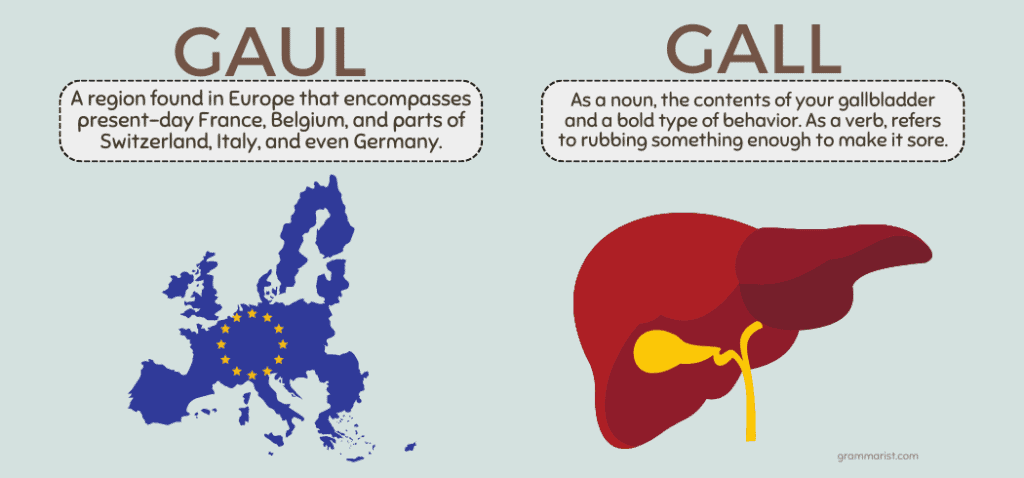What exactly does it mean to have the gall? Is it good or bad? Growing up in Newfoundland, it’s an expression I’ve heard a thousand times, and I always wondered what it really meant, and now I do! So, I’ll explore the definition of gall and talk about its origins. I’ll also show you different ways the word is used in the English language.
But Is It Gall or Gaul?

Before we go deep into the meaning of this phrase and the word gall, I’d like to straighten up any confusion you might have on whether it’s “gall” or “Gaul.”
They sound the same, making them homophones, but their meanings couldn’t be more different from each other.
“Gaul” is actually a region found in Europe that encompasses present-day France, Belgium, and parts of Switzerland, Italy, and even Germany.
But “gall” has nothing to do with geography. It has several modern-day meanings; the contents of your gallbladder and a bold type of behavior are the most common. In these contexts, it’s a noun.
But gall can also be a verb when used to refer to rubbing something enough to make it sore.
What Does Have the Gall Mean?
To have the gall basically means to have the bold-faced audacity or nerve to do something that some people might think of as impudent or even disrespectful.
It’s like saying how dare someone to have the nerve to do that thing. Like, if someone cuts in line in front of you, you might chortle and say, “Can you believe she had the gall to do that?”
Gall Etymology and Origins
The word “gall” has a rather interesting history. It comes from the old English word galla, which means bile. Back in medieval times, it was thought that bile was actually responsible for someone’s bad temper and rude behavior. So, when they acted rudely or disrespectfully, people would say they had too much gall in their system, aka had the gall.
In the late 14th century, gall also meant the excretion of insect eggs onto a plant.
But in the creation of the four humors, aka liquids made by the body: blood, bile, melancholy, and phlegm, Shakespeare is actually said to have made the phrase “have the gall” mainstream in his character creations.
What Is the Plural of Gall?
The plural of “gall” is simply “galls.” It’s not really a common word, but you might find it in certain contexts. Like, if you’re a gardener, you might understand that galls are abnormal growths that can appear on the leaves or stems of plants.
What Is an Example of Gall in a Sentence?

- I can’t believe David had the gall to ask for a raise after only working here for a month! I’ve been here for ten years and have yet to get a raise.
- Kate had the gall to show up to our party uninvited.
- It takes a lot of gall to lie to your boss and expect you’re going to get away with it.
- My husband had the gall to criticize my cooking even though he could barely boil water.
- I have to go in for surgery next month to have a gallstone removed.
- I have to admire my daughter’s gall – she’s definitely not afraid to speak her mind, even if it means disagreeing with us.
Do You Have the Gall?
So, there you have it—that’s everything I know about the meaning of gall, with a wee bit of its history to go along with it. While it’s obviously not a word you’ll hear every day, it’s still a useful one to have in your vocabulary’s arsenal.
Enjoyed reading about these homophones? Check out some others we covered:
